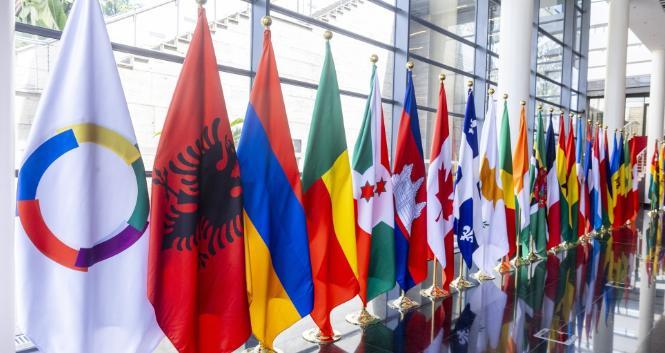Oria K. Vande Weghe
Africa-Press – Rwanda. From November 18 to 20, 2025, Kigali will host, for the first time, a governing body of La Francophonie: the 46th Ministerial Conference of La Francophonie (CMF). This is a symbolic moment for the Francophone family, which has never before convened in East Africa, and a symbolic moment for Rwanda, which was among the twenty-one founding countries that met in Niamey in 1970 to create an organization rooted in solidarity, dialogue and shared values among Francophone peoples.
A powerful theme
More than half a century later, it is in a modern, dynamic and forward-looking African capital that delegations from the 90 member states and governments gather to reflect on the future of the Francophone world around a powerful theme: “Thirty years after the Beijing Conference: the contribution of women in the Francophone space.”
Thirty years after that conference – which established the most ambitious international framework ever adopted to advance gender equality – the assessment is unequivocal: the challenges remain immense, everywhere in the world. Persistent wage inequalities, rising feminicides, domestic violence, forced marriages, and systemic discrimination demonstrate that genuine equality is still far from being achieved.
This theme’s choice is far from incidental. Rwanda is frequently cited as an example in the field of gender equality. In the aftermath of the 1994 Genocide perpetrated against the Tutsi, Rwandan women stood at the heart of the country’s recovery—in families, in the economy, in public institutions, and in civil society. Today, they continue to play a decisive role in governance: the Rwandan Parliament is composed of more than 60% women, a world record for over a decade, and women hold top-level positions across all key sectors of development, security, justice, entrepreneurship, and innovation.
Debating the role of women within La Francophonie in a city where progress is visible and tangible gives a unique resonance to our work. Here, parity is no longer an abstract ideal but a concrete lever for effectiveness and transformation.
A troubled global context
And transformation is precisely what today’s world needs more than ever.
This 46th CMF takes place in a complex global context in which crises continue to accumulate: armed conflicts, political instability, climate disruption, and rising inequalities. No region is spared—not even La Francophonie, which brings together countries of various profiles, from advanced economies to nations in reconstruction, from consolidated democracies to societies in transition.
Faced with these upheavals, the question of the real usefulness of multilateral organizations arises. What purpose do these cooperation spaces still serve in such a divided world? What is their capacity to act, to prevent, to influence? To many citizens, global diplomacy increasingly resembles an endless succession of panels, summits, and conferences—a “panelisation” of the world that struggles to produce concrete results.
A Francophonie in transformation
The relevance of Francophone action will be at the heart of the political closed-door session of this CMF. And it is precisely these questions that La Francophonie, under the leadership of its Secretary General, Louise Mushikiwabo, has chosen to confront—not with resignation, but with adaptation.
Since her election in 2018, and at the request of the Heads of State and Government who entrusted her with this mandate, she has undertaken a series of reforms to reposition La Francophonie on the global stage, with a clear objective: to make the OIF a modern, useful, and influential organization.
In practical terms, this has involved a strategic refocusing of OIF programmes around a set of core priorities: the French language promotion, youth, women’s empowerment, sustainable economies, peace, and democracy. This shift has not only made it possible to concentrate available resources on initiatives delivering tangible results but has also improved the clarity and visibility of the Organization’s mission.
In parallel, the Secretary General has sought to strengthen La Francophonie’s diplomatic reach by reaffirming its presence in major international debates and consolidating its network of external representations, now true hubs of influence and cooperation. These deep and structural transformations reflect a conviction: La Francophonie is not a legacy of the past. It is, on the contrary, an instrument for the future—capable of consolidating its place among inter-governmental organizations while continuing to embody a human-centred multilateralism, both clear-eyed about global challenges and confident in the ability of countries to find solutions together.
A key milestone between the 2024 Villers-Cotterêts Summit and the next Francophonie Summit to be held in Cambodia, in 2026, the Kigali CMF offers ministers an opportunity to reflect on how to strengthen collective action and revive the spirit of Niamey: that of a community of values built on dialogue, mutual listening and shared purpose.
In fact, in these uncertain times, La Francophonie has never been more necessary. More than just an institution, it is the voice of millions of women and men who share the conviction that cultural and human diversity is a wealth to be protected and promoted.
The Ministerial Conference in Kigali is more than a milestone: it marks the consolidation of a Francophonie that embraces its strength, affirms its coherence, and chooses effectiveness over slogans.
The writer is the Director of Communications and Spokesperson for the Secretary General of the Organisation internationale de la Francophonie (OIF).
Source: The New Times
For More News And Analysis About Rwanda Follow Africa-Press






